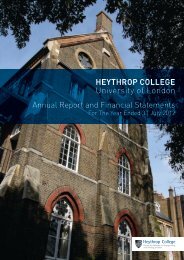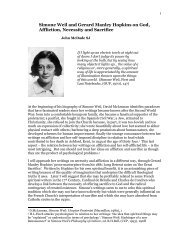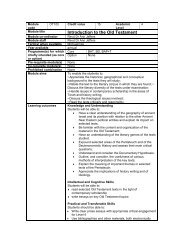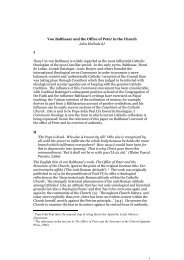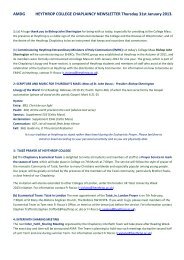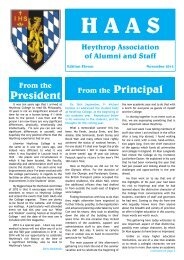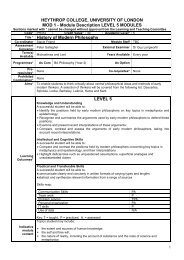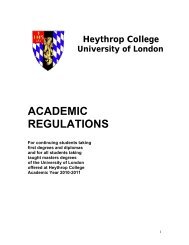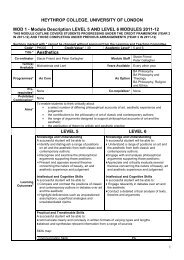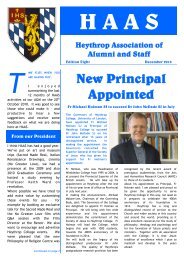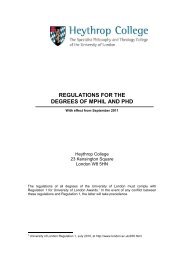Wallace_Stevens.pdf - Heythrop College
Wallace_Stevens.pdf - Heythrop College
Wallace_Stevens.pdf - Heythrop College
Create successful ePaper yourself
Turn your PDF publications into a flip-book with our unique Google optimized e-Paper software.
14<br />
If this works, it will be, I suspect, an intensely, solipsistic experience: the poem will cast a spell on<br />
the mind and bring it to a pitch of perception and awareness. The listener, through the words of<br />
the ‘modern poetry’ that is to stand in place of God, is to hear the words and thereby hear herself<br />
intimately, as in an emotional exchange in which ‘two people’ experience themselves becoming<br />
‘one’. (Surely a sexual reference here.) The ‘metaphysician in the dark’ (the poet) produces<br />
sounds (words) which wholly contain the mind raised to heightened and understanding. <strong>Stevens</strong><br />
wants us to think that the real is transformed by imagination in such a way that we grasp the real<br />
pleasurably in its poetical reordering. Against the accusation that art is an escape from the real, a<br />
preference for the imagined over the real (Plato), <strong>Stevens</strong> insists that a poetry that deals with<br />
reality does not remove us from it, but returns us there:<br />
There is, in fact, a world of poetry indistinguishable from the world in which we live, or, I<br />
ought to say, no doubt, from the world in which we shall come to live, since what makes<br />
the poet the potent figure that he is, or was, or ought to be, is that he creates the world to<br />
which we turn incessantly and without knowing it and that he gives to life the supreme<br />
fictions without which we are unable to conceive of it.<br />
He continues in ways which surely evoke the experience described in ‘Of Modern Poetry’ of the<br />
insight and understanding which comes to us when the poem works:<br />
The deepening need for words to express our thoughts and feelings which, we are sure,<br />
are all the truth that we shall ever experience, having no illusions, makes us listen to<br />
words when we hear them, loving them and feeling them, makes us search the sound of<br />
them, for a finality, a perfection, an unalterable vibration, which is only within the power<br />
of the acutest poet to give them. 42<br />
You should not ignore the phrases ‘all the truth that we shall ever experience, having no illusions,’<br />
because they signal the only transcendence available to us in the imaginative spell of the ‘supreme<br />
fiction’, the transformation of the real through the act of imagination. We have a ‘deepening need’<br />
for words that convey to us ‘a finality' and ‘perfection’. Just as earlier ages, <strong>Stevens</strong> surely<br />
suggests, devised images, dramas and styles of deity which gave us a fiction in which we could<br />
believe because it was treated as real, so now, when we realise that God has been imagined, we<br />
now live within poetic, imaginative fictions that we know to be both true and fictive. <strong>Stevens</strong>’<br />
quest for the supreme fiction intends it to have a determinative power over us so that what we<br />
create imaginatively governs us by enchanting us with its version of the real. ‘Imaginative truth is<br />
the most immediate way of presenting ultimate reality to a human being ... ultimate reality is<br />
what we call God.’ 43<br />
But what is conveyed in this fictive way I suspect that the goal envisaged by <strong>Stevens</strong> is the<br />
experience of full, authentic selfhood through contact with a reality whose impact on us cannot be<br />
expressed in words. 44 The work of artistic imagination is the epiphany of the concrete particulars<br />
of the world, the manifestion of ‘the poem of pure reality’, which , if it can be attained, is the<br />
fulfilment of authentic ‘vision’ (existence). In his poem, ‘Angel surrounded by Paysans,’ ‘the angel<br />
of reality’ appears at the door and says that in the angel’s presence we are led to see again:<br />
I am one of you and being one of you<br />
Is being and knowing what I am and know.<br />
Yet I am the necessary angel of earth,<br />
Since, in my sight, you see the earth again,<br />
42 ‘Noble Rider’, CP, 662-3.<br />
43 R. S. Thomas : Priest and Poet" (BBC TV, 2 April 1972) R.S.Thomas on Wikiquote.<br />
44 Some of the ideas in this section first appeared in J. McDade, ‘The Moon Prince and the Angel<br />
of Reality,’ The Way (1988), 19-26.



